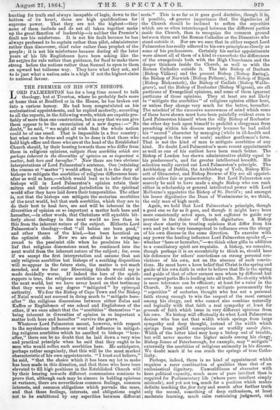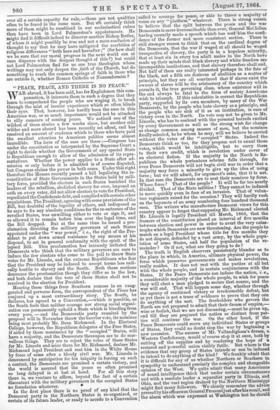THE PREMIER ON HIS OWN BISHOPS. L ORD PALMERSTON has for
a long time ceased to talk theology, but at Tiverton, where he probably feels more at home than at Bradford or in the House, he has broken out into a curious heresy. He had been congratulated on his ecclesiastical appointments, and he replied modestly, according -to all the reports, in the following words, which are capable pro- bably of more than one construction, but in any that we can give them appear to be the enunciation of a new dogma :—" No -doubt," he said, "we might all wish that the whole nation could be of one creed. That is impossible in a free country; but what can be done and ought to be done is that those who hold high office and those who are at the head of the Established Church should, by their bearing towards those who differ from them in religious opinions, mitigate those acerbities which are perhaps inherent in the diversities of opinion on so important a matter, both here and hereafter." Now there are two obvious interpretations of Lord Palmerston's sentence. One (retaining the comma at "matter") would affirm that it is the duty of bishops to mitigate the acerbities'of religions differences here- after as well as here,—which would lead us to infer that the bishops will in Lord Palmerston's opinion retain their mitres and their ecclesiastical jurisdiction in the spiritual world after they have laid down their temporalities. The other is, not that the bishops can mitigate the sectarian acerbities of the next world, but that such acerbities, which they are to do their best to heal here, are and will be inherent in the • diversities of opinion on so important a matter both here and hereafter,—in other words, that Christians will squabble bit- terly about theology in the next world no less than in this from the inherent nature of the subject. Hitherto Lord Palmerston's theology—that "all babies are born good," and other theses of the kind,—has been heretical on the optimist side. Now we are afraid he is swinging _round to the pessimist side when he proclaims his be- lief that religious dissensions must, be continued into the .next world from the inherent nature of the subject; for, even if we accept the first interpretation and assume that not only religious acerbities but bishops of a soothing disposition will re-appear in the future state, the matter is not much _mended, and we fear our Dissenting friends would say is made decidedly worse. If indeed the lore of the spirit- .rappers is true, the religions acerbities no doubt do exist in • the next world, but we have never heard on that testimony that they were in any degree "mitigated" by episcopal authority. We fear the Bishop of Cape Town and the Bishop -of Natal would not succeed in doing much to "mitigate here- -after" the religious dissensions between either Zulus and Xaffirs or Englishmen of one school and Englishmen of the other, if we once admit that the " acerbities" themselves "as being inherent in diversities of opinion in so important a matter both here and hereafter" survive the grave.
Whatever Lord Palmerston meant, however, with respect to the mysterious influence or want of influence in mitigat- ing religious acerbities which he ascribed to bishops "here- after," there can be no doubt that he laid down a very wise and practical principle when he said that they ought to be men who would soften such acerbities here. He anticipates, perhaps rather sanguinely, that this will be the most marked characteristic of his own appointments. "I trust and believe," he said, "that the choice which it has been my lot to make has been made in this direction, and that those who have been elevated to fill high positions in the Established Church will by their bearine, towards different communions continue to prove that, although each may be sincere in holding opinions at variance, there are nevertheless common feelings, common interests, and common obligations which pervade the mass, and that those feelings, interests, and obligations ought not to be embittered by any asperities between different sects." This is so far as it goes good doctrine, though it is if possible, oft greater importance that the dignitaries a the Church should be inclined to soften the asperities which are so often interchanged between the different parties inside the Church, than to recognize the common ground between them and the Roman Catholics or the Dissenters who stand outside it. Nor are we sure that in either respect Lord Palmerston has really adhered to his own principle so closely as some of his predecessors. Certainly his earlier appointments were almost all of them of a kind to exacerbate the differences of the evangelicals both with the High Churchmen and the deeper thinkers inside the Church, as well as with the Roman Catholics outside it. The late Bishop of Durham (Bishop Villiers) and the present Bishop (Bishop Baring), the Bishop of Norwich (Bishop Pelham), the Bishop of Ripon (Bishop Bickersteth), the Bishop of Carlisle (Bishop Waldo- grave), and the Bishop of Rochester (Bishop Wigmm), are all partizans of Evangelical opinions, and some of them ignorant partizans of those opinions. They at least are not likely to "mitigate the acerbities" of religious opinion either here, or unless they change very much for the better, hereafter. The mischief of the excessive narrowness of mind which some of these have shown must have been painfully evident even to Lord Palmerston himself when the silly Bishop of Rochester the other day took upon himself to prohibit a clergyman from preaching within his diocese merely because he had soiled his "sacred" character by managing (while in ill-health and not engaged in the cure of souls) another gentleman's farm. That is not the kind of man to mitigate acerbities of any kind. No doubt Lord Palmerston's more recent appointments as well as one of his earliest have been much better. The • Bishop of London has shown administrative ability equal to his predecessor's, and far greater intellectual breadth. His selection really carried out Lord Palmerston's principle. The Archbishop of Dublin, the Archbishop of York, Bishop Elli- cott of Gloucester, and Bishop Browne of Ely are all appoint- ments either fair or praiseworthy. But Lord Palmerston can scarcely be said to have made a single Bishop who can rank either in scholarship or general intellectual power with Lord Melburne's appointee the Bishop of St. David's; and amongst his lesser dignitaries the Dean of Westminster is, we think, the only man of high mark.
Again, we hold that Lord Palmerston's principle, though a good one so far as it goes, and though it might have been more consistently acted upon, is not sufficient to guide any premier in the choice of Church dignitaries. I Bishop may show charity in treating opinions that differ from his own and yet be very incompetent to influence even the clergy of his own diocese-in the same direction. To exercise with any power the healing influence Lord Palmerston speaks of,— whether "here or hereafter,"—we think other gifts in addition to a conciliatory spirit are requisite. A bishop, we conceive, though perhaps it is an eccentricity to think so, should base his deference for others' convictions on strong personal con- victions of his own, not on the absence of such convic- tions. He must have a keen belief that Christ is the spring and guide of his own faith in order to believe that He is the spring and guide of that of other earnest men whom by different, but convergent paths He is leading into all truth. No charity which is mere tolerance can be efficient; at least for a ruler in the Church. No man can expect to mitigate permanently the "asperities" of sectarian thought who has not a personal faith strong enough to win the respect of the most earnest among his clergy, and who cannot also combine naturally and logically with that faith a real sympathy at least for grounds of faith which issue in very different opinions frora his own. No bishop will effectually do what Lord Palmerston desires who has not that width which springs from large sympathy and deep thought, instead of the width which springs from pallid conceptions or worldly savoir faire. Width of the latter kind may keep a bishop out of trouble, but will never master the higher minds among his clergy. Bishop jeune of Peterborough, for example, may "mitigate" externally the acerbities of religious animosity in his diocese. We doubt much if he can reach the springs of true Catho- licity. Perhaps, indeed, there is no kind of appointment which requires a rarer combination of qualities than that of an ecclesiastical dignitary. Unworldliness of character with keen political capacity, much more of pure intellect than is required for Parliamentary life (where pure intellect simply misleads), and yet not tea, much for a position which makes definite teaching the first duty and search after farther truth only the second, something of deep enthusiasm, at least moderate learning, much calm restraining judgment, and.































 Previous page
Previous page